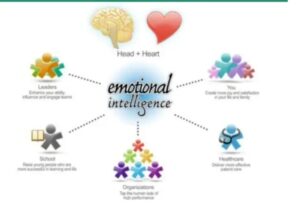by chandiniann | Oct 31, 2023 | Interesting Reads
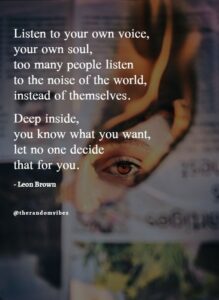
Image Courtesy: Pinterest
The depth of our inner world has an unspoken desire, a quiet dream that most of us are trying to understand. It is a journey to untangle the complex webs of our souls without any definite routes, making us lost in the vague world of our emotional impulses and erotic yearnings.
To others, they experience some internal war for pulling between their wishes and responsibilities, giving them a beautiful feeling of self-searching. On the other hand, some others say that they lose their own essence as they transform into another being.
This mysterious expedition frequently involves a feeling that something must be done even when the road ahead remains unclear. We know there is a problem somewhere, but what to change and how to effect the changes defy clear understanding.
This transition entails a shift away from dedicating the majority of our time and energy to fulfilling the expectations and wishes of others. Instead, it is a profound inner journey, a quest for spiritual growth, and the pursuit of profound serenity and joy in communion with our innermost selves.
This change that we are going through is a sign coming from the inmost center of our soul. Listening to this call prompts us along an adventure of being more than just alive but prospering. Nevertheless, when we decide to ignore that, our body and mind could be loaded with consequences of our apathy.
In its subtle wisdom, the soul keeps whispering to us the entire time, offering the inner compass that leads us on the path of living our deepest truths. It demands that we become attuned and walk towards being authentic, true, and meaningful living. Are we listening?

by chandiniann | Oct 27, 2023 | Interesting Reads
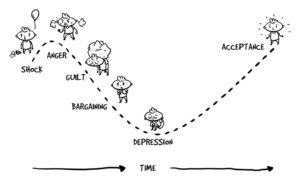
Image Courtesy: Stephanie Fattorini
Loss is an intrinsic part of our journey through life, and it takes many forms. It can be the loss of a job, a cherished relationship, a dream unfulfilled, or any significant change that alters the course we have set for ourselves. Believe me when I say that I have dealt with all of these losses in a variety of ways. (You probably have too). Dealing with loss, in all its variations, can be a tumultuous and emotionally challenging experience.
Acknowledging Emotions
EI begins with recognizing emotions. Grief, anger, and sadness accompany loss. Acknowledge these feelings without judgment, as a first step towards healing.
Self-Awareness
Developing EI means understanding your emotional responses. Self-awareness forms a strong foundation for coping and moving forward.
Empathy for Self
EI extends empathy towards yourself. Be kind during the healing process; it’s okay to take your time. Don’t let anyone tell you otherwise.
Compassionate Communication
EI enhances effective communication, crucial when reaching out to others affected by loss. Compassionate communication forges stronger connections and support networks.
Building Resilience
EI equips you to build resilience, vital for adapting to change and bouncing back from setbacks.
Motivation for Change
EI ignites the motivation to seek positive change. Loss catalyzes personal growth and transformation.
Seeking Professional Help
Recognize when loss becomes overwhelming and seek professional assistance. EI embraces this acknowledgment.
Loss is universal, challenging yet transformative. Embracing Emotional Intelligence provides emotional tools for coping, adapting, and thriving in the face of loss. It’s not about suppressing emotions but understanding and navigating the storm of loss with grace and resilience. Through this journey, loss, in all its forms and shapes can elevate our lives.
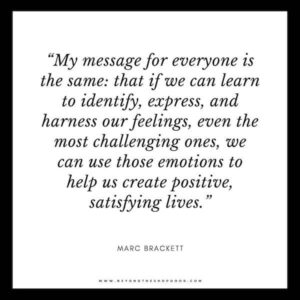
by chandiniann | Oct 26, 2023 | Interesting Reads

In the complex landscape of relationships, Emotional Intelligence (EI) stands as a beacon of hope for couples facing turbulence. This article explores the profound role of EI in mending fractured bonds and improving communication when things aren’t going smoothly.
Navigating Emotional Storms
In times of emotional turmoil, EI becomes an anchor. It involves recognizing and regulating one’s emotions while also embracing a deep understanding of their partner’s feelings. This foundation of self-awareness and empathy can be instrumental in de-escalating conflicts.
The Art of Meaningful Exchange
Effective communication is the lifeline of relationships, and EI is the secret ingredient to nurture it. It empowers couples to create a safe space for candid conversation, emphasizing active listening and open dialogue. By expressing themselves honestly and empathetically, couples can bridge the gaps that often lead to misunderstandings.
Bridging Differences with Emotional Intelligence
In the face of disputes, Emotional Intelligence equips partners with the skills to find common ground. It fosters resolution strategies rooted in compromise rather than confrontations, shifting the focus from blame to a solution-oriented approach.
A Brighter Tomorrow Together
While developing EI as a couple requires effort, the rewards are boundless. Couples who integrate EI into their relationship dynamics create an environment characterized by respect and unwavering support, strengthening their bond for the years ahead.
In the realm of relationships, Emotional Intelligence is a lifeline. It mends the torn fabric of love, fosters understanding, and weaves an enduring connection based on empathy and open communication.

Image Courtesy: Pinterest
by chandiniann | Oct 23, 2023 | Interesting Reads
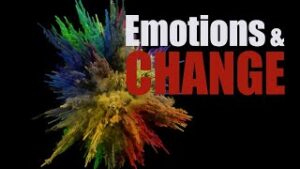
Image Courtesy: Six Seconds
In the ever-evolving business realm, change is a constant (as it is in every aspect of our lives). Organizations that can adapt swiftly to new circumstances are the ones that thrive. However, managing change effectively isn’t just about strategy and planning; it’s also about understanding and harnessing the power of Emotional Intelligence (EI).
What is Emotional Intelligence?
Emotional Intelligence, often referred to as EI or EQ, is the ability to recognize, understand, and manage our own emotions and the emotions of others. It encompasses self-awareness, self-regulation, empathy, and effective communication. In change management, EI plays a pivotal role in leading and navigating transformations successfully.
Empathy Fuels Understanding
Change is often met with resistance and fear. People are naturally inclined to be wary of the unknown. Empathy (a key component of EI) plays a crucial role in this context. An emotionally intelligent leader understands the concerns and anxieties of their team. By listening and acknowledging these emotions, they can create a more receptive environment for change. Empathy thus builds trust, and trust is essential for change management.
Effective Communication
Clear and empathetic communication is a cornerstone of change management. Leaders with high EI can convey the need for change in a way that resonates with their team, making it more likely that the team will ‘buy into’ the process. Furthermore, emotional intelligence allows leaders to address concerns and answer questions in a way that reassures employees.
Adaptability
Change sometimes goes differently than planned. It’s crucial to be adaptable and flexible. Leaders with high EI can adjust to unforeseen challenges while maintaining their composure and ensuring their teams stay motivated. They understand that setbacks are part of the journey and handle them with resilience.
Self-Management
Leaders who possess strong self-regulation skills are less likely to be derailed by their own negative emotions during the change process. They can stay focused, manage stress, and inspire their teams with a sense of calm and control.
Building a Culture of EI
To truly harness the power of EI in change management, organizations need to foster a culture of emotional intelligence. This starts with leadership setting the example and encouraging its development throughout the team. Training and workshops can help employees understand and improve their emotional intelligence skills. (Connect with me chandini.khanna@gmail.com)
In a world where change is the only constant, leaders who understand the emotional dimensions of change and employ Emotional Intelligence as a tool for transformation will stand out. They are not just managing change but leading their teams through it, creating an environment where people thrive and embrace new challenges. Harness the power of Emotional Intelligence, and you’ll find that change becomes not just a challenge to overcome but a path to growth and success.
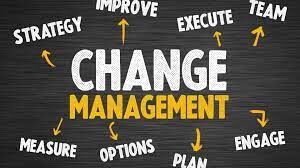
Image Courtesy: Evalueserve
by chandiniann | Oct 18, 2023 | Interesting Reads

Image Courtesy: YouTube
There is a rule in this bustling and globalized setting for business that is seldom acknowledged but can sometimes be decisive in establishing someone’s standing among his or her colleagues. Business etiquette is another word for this code, and it extends much further than knowing which fork to use in a formal setting. Business etiquette involves the appropriate behaviors, forms of communication, and interpersonal skills that contribute to professional relationships and the general organizational culture. At its core, lies Emotional Intelligence (EI)—a potent variable that determines and supports business etiquette.
Understanding Business Etiquette: The Subtle Art
The concept of “business etiquette” is not static as it changes depending on the prevailing culture within a society at any particular time and place. Among many threads of this intricate web are punctuality, appropriate apparel, and productive emails among others, as well as the knowledge of how to communicate properly between persons in different cultures. Business etiquette, at its core, simply expresses respect, courtesy, and thoughtfulness that creates a conducive work environment.
Emotional Intelligence and Business Etiquette
The term emotional intelligence, also known as EI or EQ refers to the capacity to acknowledge, comprehend, control, and make good use of one’s own feelings together with other people’s feelings. This is one of the most complex sets of skills, which makes it very important to correct business manners. Here’s how EI affects and sustains business etiquette:
Self-Awareness: EI rests on self-awareness – identifying one’s feelings, strengths, and weaknesses. Self-awareness within the context of business etiquette makes one realize the effect of one’s behavior on fellow employees or business partners. It helps professionals point out specific aspects of their etiquette that may require improvement.
Empathy: The concept of empathy is core to EI, which means the capacity to comprehend and identify with other people’s emotional states. This concept involves metaphorically stepping into the shoes of your colleagues, customers, or partners within the business setting, signifying a shift in perspective and understanding their viewpoints. Empathy is a high-level trait that helps one to respond to people’s needs and emotional issues hence ensuring a professional code of conduct. For example, empathy can be crucial in negotiation, conflict settlement, and the provision of services to customers.
Effective Communication: Business etiquette always focuses on effective communication. With EI, you can improve communication by being clear, active listening, and thinking about other people’s opinions. It lets you express yourself appropriately, making for seamless conversations and good business relations.
Stress Management: Stress can sometimes cause people not to behave appropriately in the business world. High EI individuals are able to control their stress and emotions which help them stay calm and professional in demanding circumstances. This is essential in maintaining business linkages as well as a reputation.
Conflict Resolution: Business etiquette is challenged on most occasions during conflicts. People with high EI may enter into a conflict with an element of compassion and empathy, pursuing solutions that will be equitable for all parties involved. It also helps save relationships and sometimes may be the basis of a new creative way of solving problems.
Leadership and Team Dynamics: EI plays an important role in establishing a good standard of business conduct that leaders need to adopt. As such, high EI leaders lead to developing an environment of respect and courtesy among other things which spread across the whole organisation. They spearhead teamwork and encourage good business conduct in the organization.
Sustaining Business Etiquette through EI
The culture of business etiquette, however, should rather be a way of life that every organisation needs to instill and maintain among its staff members. However, emotional intelligence acts similarly to a cement that holds and supports business etiquette in a sustainable manner. Individuals and teams learn how to cultivate their EI as they become increasingly aware of the subtleties of business etiquette that should be applied in all offices across countries.
In conclusion, business etiquette transcends mere rule-following, as it lies at the heart of every professional interaction. The influence of Emotional Intelligence in molding and preserving business etiquette cannot be emphasized enough. Furthermore, individuals with high EI not only embody business etiquette with finesse but also have the remarkable ability to propagate it throughout their professional spheres. In a world where relationships and respect hold immense value, cultivating and spreading Emotional Intelligence, is the key to mastering the art of business etiquette.
